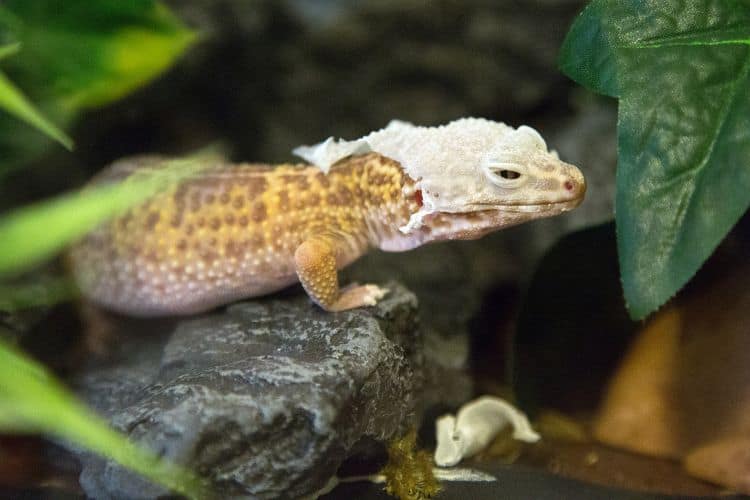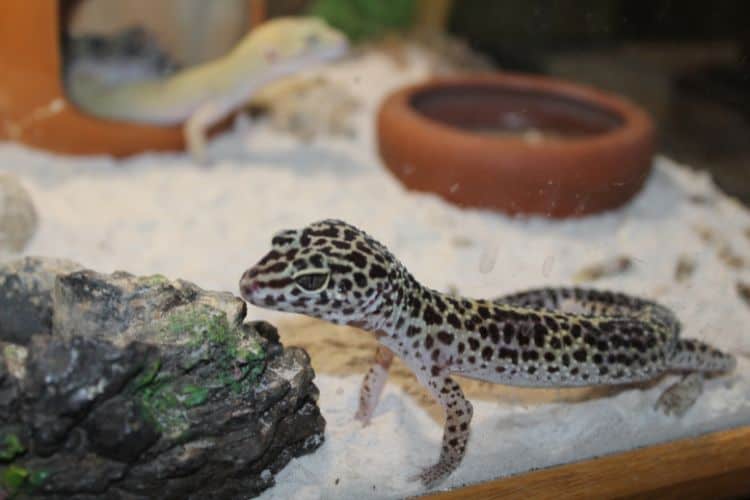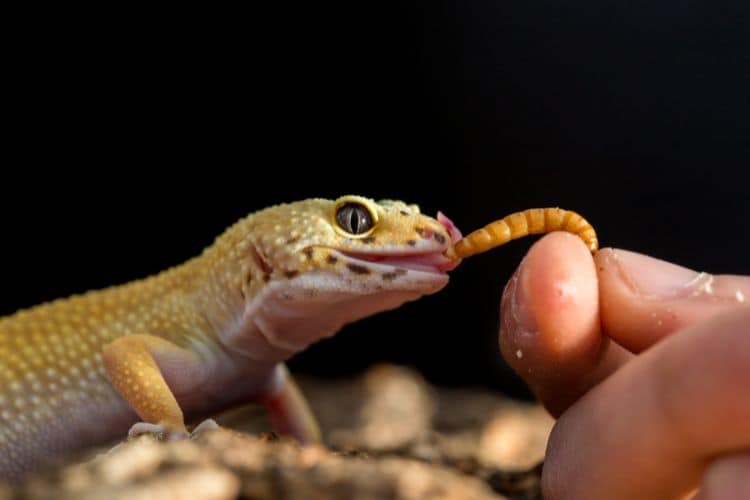So, you’ve finally bought that leopard gecko you’ve always wanted, and everything has been going great. All of a sudden, it starts defecating white poop.
Now you’re full of questions: What does leopard geckos’ white poop mean? What can I do to fix this? Well, that’s what you’ll find out today!
What Does Healthy Leopard Geckos Poop Look Like?
You can’t identify if white poop is a bad sign without knowing what healthy leopard gecko poop looks like. It usually consists of two parts: The feces and the urates.
The feces look like dark brown sausages, while the urates look like off-white drops or small sausage rolls.
Although mammals discharge uric acid (urate) in liquid form, reptiles release it in solid form to save water.
Don’t be surprised if you spot a bit of liquid around the poop. That’s just their pee, and it’s part of their natural waste process. As long as there isn’t too much, you shouldn’t be alarmed.
Why Is Your Gecko Producing White Poop?
Now that you know what normal leopard gecko poop looks like, it’s time to understand where that white defecation is coming from.
1. Eating Shed Skin

Leopard geckos shed several times a year to allow new healthy skin with durable protective layers to grow. It’s a natural part of their growth cycle.
Here’s the thing: These reptiles lose plenty of crucial nutrients during that process. So, they feed on that shed skin to get some of those nutrients back into their system.
You can probably guess that’s the source of that whitish stool. Geckos don’t always process all the skin they digest, so it comes out the other end in the form of white poop.
2. Eating Bright Substrate
It’s not uncommon for these reptiles to ingest part of their substrate, and it’s something most of you worry about. After all, it causes several intestinal issues like constipation and lethargy.
Well, it could also affect the color of their poop. If your gecko swallows a bright substrate, like sand, it can defecate white/off-white poop.
3. Defecating Parasite Eggs
You probably already know that leopard geckos have a knack for parasites. Well, some of these parasites can leave a surprising mark on their poop.
Parasites like Oxyurid, Strongylid, and trematode can pass their eggs through the gecko’s feces, which can result in a change of color.
However, it’s important to note that these eggs don’t cause an extreme transformation; they don’t turn the poop completely white. They just leave several white spots on it.
4. Producing Urate
You’d be surprised how easy it is to confuse that off-white urate with gut issues. That usually stems from not knowing what the normal leopard gecko poop looks like.
As previously established, though, it’s a natural part of stool and only indicates your gecko is facing no intestinal issues.
What to Do When Your Gecko Produces White Poop?
There isn’t a definitive answer to that question, as it depends on the cause of the white poop.
For instance, if your gecko produces whitish poop because it ate its shed skin, there’s nothing to do here. It’s not like that will harm it or anything.
However, if it defecates white poop because it swallowed bright substrate or is having a parasite infection, take it to the vet. These issues are usually not that alarming, so don’t worry too much.

What Other Color Changes Happen to Leopard Geckos’ Poop?
So, you know what causes leopard gecko’s poop to turn white and what to do when that happens. What about other colors, though? What can prompt these changes?
1. Yellow Poop
In most cases, yellow poop is a sign of dehydration. It’s similar to how your pee turns dark yellow when you’re dehydrated. However, vitamin overdose can also be an influential factor.
That’s more common with new pet owners who think supplying their geckos with more vitamins helps them grow strong and healthy. That’s not necessarily true, though.
Luckily, you don’t have to do much to treat that issue. Just make sure your gecko has access to clean water all the time and adjust its diet to reduce the number of vitamins it’s receiving.
If that doesn’t work after a while, take it to the vet. It might be a parasitic infection.
2. Green Poop
Green poop indicates your leopard gecko might have ingested a few plants. Remember, these reptiles are insectivores. That means they can’t digest plants, only insects.
So, your priority should be looking for any live or fake plants in their enclosure and removing them immediately. If that doesn’t work, check the substrate.
Consuming loose substrates, like moss, dyed sand, or paper rolls, can prompt green poop.
If you’ve recently made any changes to your gecko’s diet, they might take a while to adjust to that change. It’s not uncommon for their poop to temporarily turn green during that time.
Diarrhea can also cause leopard geckos’ poop to turn green as it speeds up the digestive process.
You see, geckos’ bodies can’t break down bile properly. As a result, it passes through the digestive tract quickly and seeps into the poop, turning it green.
Can Leopard Geckos’ Poop Change in Consistency?
Color isn’t the only way in which leopard geckos’ poop can change. Healthy gecko poop should be firm and round. If you start noticing watery, shapeless stool, you might have a problem.
Diarrhea
Loose stool is a clear sign of diarrhea. You can tell it’s diarrhea if your gecko is experiencing fatigue, lethargy, and a sudden loss of appetite.
The most effective way to fight diarrhea is to prevent it in the first place.
Keep your gecko’s enclosure clean and use proper substrate. If it’s too late, though, you might want to visit the vet with a few stool samples.
Diet Change

A change in diet can also cause poop to become watery. Look, diversifying your gecko’s insect diet is never a bad idea. The important part is to introduce new foods gradually.
Geckos need time to get used to new insects. Rushing the process can lead to digestive issues that cause the poop to be runny.
If you usually feed your gecko five Dubia roaches a day and want to sprinkle a few mealworms, do it gradually. Start with four roaches and one mealworm. The next day, make it three roaches and two mealworms, and so on.
Your gecko will gradually adapt to having mealworms in its diet and won’t defecate runny poop.
In rare cases, the watery defecation can be accompanied by a loss of weight and appetite. That’s another sign of a parasitic infection.
Can Leopard Geckos Release Undigested Insects in Their Poop?
Yes, as gross as it sounds, geckos can sometimes release undigested insects in their poop. That usually suggests digestive issues, so your first job is to identify the cause.
Cold Enclosure
Would you enjoy it if you had to eat lunch at the North Pole without a coat or a blanket? You probably wouldn’t even be able to eat. Neither would leopard geckos.
These reptiles thrive in temperatures ranging between 75 to 85°F. If it drops below 70℉, it can significantly reduce your gecko’s metabolic rate.
As a result, they won’t be able to digest insects properly and will release them in their poop.
Helpful tip: Use a digital
Impaction
You probably saw this one coming. You already know consuming loose substrate can cause digestive issues. Is it surprising to know it prevents geckos from fully ingesting insects?
Check the soil for any signs of substrate. If you find them, take your gecko to the vet.
Parasitic Infection
Parasitic infections can mess with the digestive system, causing intestinal issues like lethargy. So, it’s no wonder it can prevent leopard geckos from digesting insects properly.
Excessive Feeding
The problem can be as simple as your geckos eating too many insects that they can’t digest them all. The same thing goes if you’re feeding them larger insects.
Leopard geckos’ bellies are tiny, so give them adequately sized bugs. As a rule of thumb, don’t feed your geckos anything larger than the space between their eyes.
What Is Your Leopard Gecko Not Pooping?
After reading 1000+ words about poop, you’re probably wishing your gecko wouldn’t defecate at all. That would actually be another sign that something is wrong.
Low Temperatures
If your leopard gecko hasn’t defecated in a long time, your first instinct should be to check the temperature of the enclosure.
If your cage is too cold, your geckos won’t be able to regulate their bodies’ temperatures, which prevents their bodies from functioning normally.
It starts with digestive issues and ends with loss of appetite, which would explain the lack of poop.
Dehydration
Staying hydrated is necessary to keep the digestive tract healthy and functioning. If your gecko isn’t pooping, it may not be getting enough water to keep the digestive tract running.
Wrapping Up
Now you know what leopard gecko’s white poop indicates. It’s usually not that serious, but if you’re worried, you can always take your scaly friend to the vet to ensure there’s no threat to its life.

